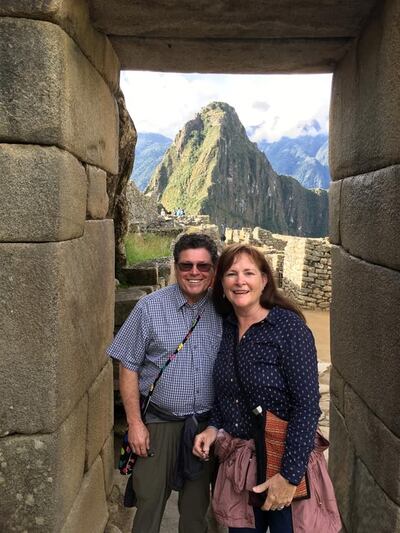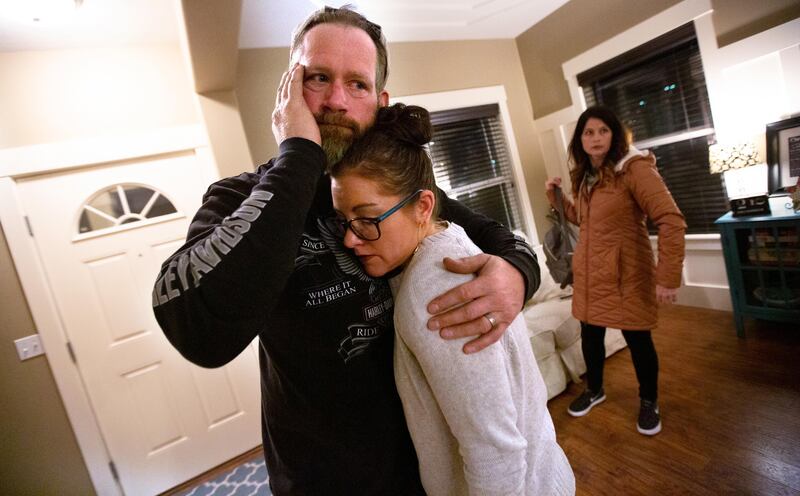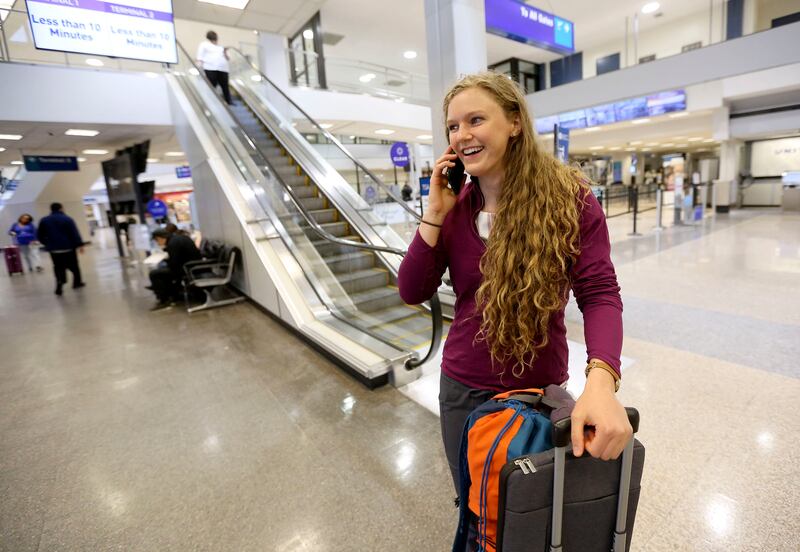SALT LAKE CITY — When Jodi and Brad Dallof, a retired couple from St. George, departed for a vacation to Peru last week, they weren’t overly worried about the novel coronavirus or COVID-19. Concern was mounting in the U.S. but worldwide attention was still focussed on China and Europe. Only about a dozen cases had been confirmed in the South American country with a population of 32 million.
The situation in Peru quickly escalated, however, and by Sunday, March 15, there were 71 cases. As the Dallofs were gazing across the lush mountain crests of Machu Picchu that day, Peruvian President Martín Vizcarra was preparing to declare emergency quarantine measures that would close the borders within 24 hours and seriously limit travel, even in private automobiles, for 15 days.

Jodi Dallof, 62, said the news came “like a sledgehammer.”
With little warning, the Dallofs found themselves stranded, like thousands of other Americans in dozens of countries including Morocco, Tunisia, Cambodia, Chile, Honduras and Guatemala. More than 65 countries have announced varying levels of restrictions on international travel in response to the coronavirus, according to The New York Times. As nations around the world closed their borders, forcing airlines to cancel incoming and outgoing flights, these families scrambled to find a way home.
Now, the U.S. government is starting to work with other countries to get their citizens out. The State Department set up a global task force on Thursday to support evacuation plans for U.S. citizens stuck overseas. ABC News reported that the U.S. has arranged chartered flights to evacuate Americans from Morocco, and President Donald Trump told reporters at the White House on Thursday that he was considering using the military to rescue stranded travelers. On Friday, an Air Force plane flew a women’s football team home from Honduras.
After five days of little sleep and a number of failed attempts to leave the country, involving multiple canceled flights and hundreds of dollars lost, the Dallofs are confirmed for a new Latam Airlines flight leaving for Miami Saturday morning.
“Let’s hope and pray we can leave,” Jodi Dallof said. She and her husband are not celebrating yet.
Commercial flight options continue to dwindle after the State Department made an announcement Thursday warning Americans not to travel internationally and urging those abroad to either return immediately or prepare to remain where they are indefinitely.
Up until this point, the consistent sentiment expressed by stranded Americans in Facebook groups and in news reports is that they feel forgotten by their country. Government representatives have been hard to reach and embassies have been slow to offer helpful solutions.
“I know those who can provide service are hopefully doing all they can and they are inundated with calls, but why does everyone feel so abandoned?” Jodi Dallof said. “It is obvious that everyone is scrambling for answers.”

Congressman Chris Stewart, R-Utah, said his office has been in contact with many Utahns stuck abroad, including the Dallofs.
“Although I am unable to discuss specific details regarding constituent cases, I can ensure you that I am doing everything in my power to bring Utahns home safely and quickly,” Stewart said in a statement for the Deseret News. “My office is working closely with the State Department and other federal agencies to take the steps necessary to organize their return.”
Finding a way out
Krissa Hendricks, 28, from Cottonwood Heights, and her father Kent Hendricks, 59, from the Seattle Washington area, had to find their own way out of Guatemala — eventually walking across the border to Mexico — after their repeated calls to the U.S. Embassy yielded no results.
Their journey to find a way home started on Sunday when they found out their flight back to the U.S. was canceled. The next best option they could find was a flight out of the neighboring country of Belize. But the next day, they found out Guatemala was closing its borders. They rushed to get to Belize before midnight, taking a tour bus and Uber, spending hundreds of dollars and driving for more than 9 hours through the dark jungle, only to find they were not able to cross the border.
“My biggest frustration is that I understand why they don’t want people to come in, but I don’t understand why they don’t want people to leave,” said Kent Hendricks, who works as an accountant. “If they had just given us some notice, some time to adjust plans, the compound effect of this all would be so minimized.”
The next two days were spent traversing the country, through many unsafe areas with limited language skills. The father-daughter duo called all possible contacts, including the office of Sen. Mitt Romney, R-Utah.
“The Romney-Lee team has been in touch with hundreds of Utahns to assist them and their love ones in returning home safely,” a representative said in a statement for the Deseret News. “The senators’ staff has been working around the clock with relevant federal agencies to coordinate transportation and medical support and ensure individuals receive the help they need.”
Eventually, through a Facebook group, Krissa and Kent Hendricks heard that some people were being allowed to leave the country by crossing the Mexican border at the city of Tecun Uman, near the country’s Pacific coast.

This time, they knew there was no time to delay. They boarded a van at 4:30 am on Thursday with four other Americans, flouting emergency laws that made it illegal to travel in groups of more than 5. When they arrived, the border gates were closed, but the guards let them walk across to Mexico where they caught a taxi to the the Tapachula airport.
After spending another night in Mexico City, Krissa and Kent Hendricks both arrived home safely in the U.S. on Friday.
“We barely got out by the skin of our teeth,” said Krissa Hendricks, a nurse. “There are still people there waiting.”
“Connecting with the U.S. Embassy, or any embassies, was not helpful at all,” Krissa Hendricks added. “They kept saying, ‘Your safety is our highest priority.’ But we ended up finding this way out on our own.”
A message from the U.S. Embassy in Guatemala released on Friday said, “The U.S. embassy is exploring all options to assist U.S. citizens in Guatemala who wish to return to the United States. This includes possible charter aircraft if commercial flights between the United States and Guatemala have not resumed.”
Hoping for help
While the U.S. government is working to develop evacuation plans, thousands of Americans remain stuck abroad, separated from their families and loved ones.
“I am alone and afraid,” wrote one woman in a Facebook group called American Citizens stranded in Guatemala. “I don’t think traveling to Mexico is an option for me especially as a single woman. I just want to go home.”
“I am a US citizen Stranded in Senegal Africa with my one yr old daughter,” wrote another woman in Americans Stranded Abroad—COVID 2020. “i’m dying to get me and my baby back home really.”
The Dallofs have five children in Utah, including daughter Tiffany Skinner, 44, who are anxiously awaiting their return. The children have been tracking their parents closely as the couple traveled from the remote village of Urubamba, to Cusco, to Lima without cell service and without speaking the language. The Dallofs have been staying in a hotel near the airport for the past two days and are prohibited from leaving the building.
“We have been trying desperately to get them home, but every avenue leads to a dead end,” said Skinner, who lives in Riverton. “My worry is that things appear to be deteriorating pretty quickly and we’re not sure how long they are going to be stuck there.”
On Thursday afternoon, Jodi and Brad Dallof video chatted with the Deseret News from their hotel room, where stark white walls and neatly tucked bedding were visible in the background. The couple had hardly slept since Sunday. Hearing rumors that food in the hotel could be in short supply, they took inventory of the supplies they had: a jar of peanut butter, two packages of crackers and a bag of trail mix.
“Though things in Lima appear pretty calm, we are afraid that if the quarantine lasts longer than 15 days that things may change quickly,” Brad Dallof said.
“The underlying feeling is it’s like a volcano about to erupt. We are trying to focus on getting home and out of here before it goes crazy,” Jodi Dallof said through tears. “We just want to be with our family.”
Update: The Dallofs safely arrived home in St. George on Monday, March 23, after flying from Miami to Denver to Las Vegas. They will self-quarantine for two weeks.


